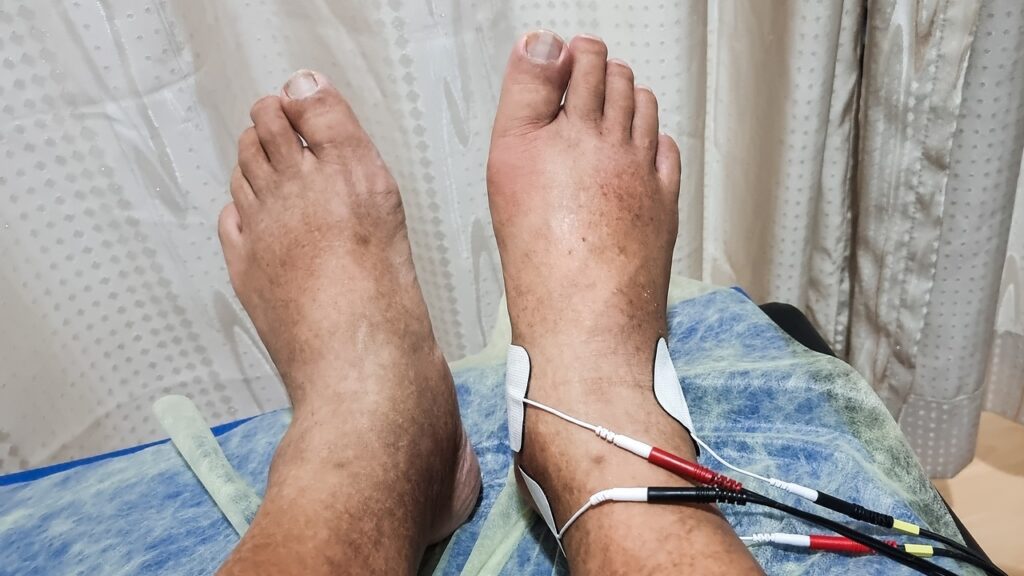Last Updated on November 4, 2025 by mcelik

Back surgery aims to ease pressure on nerves and boost mobility. Yet, it can lead to nerve injury. It’s vital to know the signs of nerve damage to act quickly.
Signs like numbness, tingling, or pain after surgery might signal a bigger problem. At Liv Hospital, we guide patients to spot these signs early. This way, we can start treatment right away.

It’s important for patients and doctors to know about nerve damage risks after back surgery. This damage can happen from direct injury, nerve compression, or inflammation and scarring after surgery.
Back surgery can harm nerves in different ways. Nerves can get injured from direct trauma, prolonged retraction, ischemia, scar tissue formation, and hardware-related injury. For example, nerves might get stretched, compressed, or even cut during surgery.
It’s key to know the difference between temporary and permanent nerve damage. Temporary damage usually heals in a few months. But permanent nerve damage can cause lasting symptoms like numbness, pain, or weakness.
| Type of Nerve Damage | Characteristics | Prognosis |
|---|---|---|
| Temporary | Numbness, tingling, or weakness that resolves over time | Often resolves within a few months |
| Permanent | Long-lasting numbness, pain, or weakness | May require ongoing management |
Numbness in the foot after back surgery is a common worry. It might be a sign of neuropathy, a condition caused by back surgery. Knowing the difference between temporary and permanent damage helps manage expectations and make treatment choices.

It’s important to know the signs of nerve injury after back surgery. This knowledge helps in managing and recovering from the injury. The symptoms vary based on the nerve type and location.
After back surgery, you might feel numbness, tingling, or muscle weakness. You could also have pain that spreads or trouble with balance. For example, some people feel nerve pain in foot after back surgery.
Back surgery aims to reduce pain and improve function. But, it can sometimes harm nerves. The severity and how long symptoms last can differ a lot between people.
Watching how symptoms change can help understand the nerve injury. Sometimes, symptoms get better as the nerve heals. But, other times, they stay the same or get worse, showing a more serious injury.
| Symptom | Description | Possible Progression |
|---|---|---|
| Numbness | Loss of sensation in a specific area | May improve or remain constant |
| Tingling | “Pins and needles” sensation | Can be transient or persistent |
| Muscle Weakness | Reduced strength in affected muscles | May improve with rehabilitation |
New leg numbness after back surgery is a serious symptom that needs quick attention. Keeping an eye on these symptoms and telling your doctor about any changes is key. This helps find the best way to handle the situation.
Leg numbness after back surgery is a serious symptom that needs quick medical help. It can cause long-term harm. We will look into why it happens and what it means, including new numbness in the legs and feet.
Feeling new numbness in your legs after surgery is scary. It might be from nerves being compressed or hurt during surgery. It’s very important to tell your doctor about any new numbness to find out why and how to fix it.
Foot numbness that doesn’t go away is a sign of a problem. It could be from nerves being squished or hurt. If not treated, it could cause permanent nerve damage. We need to watch for numbness and get help if it doesn’t go away.
Sometimes, numbness in the legs and feet means a big problem, like nerve damage or cauda equina syndrome. Seeing a doctor right away is key to fix these issues and avoid lasting harm. If numbness gets worse, you feel weaker, or you can’t control your bladder, get help fast.
Knowing why numbness happens in the legs and feet after back surgery is key. It helps get the right care quickly. By spotting the signs, patients can avoid lasting damage.
Chronic pain and sensory issues are common after back surgery. They can really affect a person’s life. Symptoms include nerve pain, burning, tingling, or electrical feelings. These signs often point to permanent nerve damage after spinal fusion or other nerve problems.
Radiating nerve pain is a big worry for those who’ve had back surgery. This pain can spread along nerves, causing discomfort in the legs and feet. Knowing these patterns helps doctors diagnose and treat nerve pain after back surgery better.
Patients might feel burning, tingling, or electrical sensations. These feelings can be short or long-lasting and vary in how strong they are. Such symptoms often mean nerve damage or irritation during surgery.
Nerve pain in the foot is a big concern for back surgery patients. This pain can come from nerve compression or damage during surgery. If you have persistent foot pain or numbness, it’s important to get it checked out.
Chronic pain and sensory issues can really impact a person’s life and well-being. By understanding these symptoms, healthcare providers can find better ways to help patients.
Muscle weakness and mobility issues are common after back surgery. They can greatly affect a patient’s quality of life. Nerve damage during surgery can cause neuropathy in feet after back surgery. This leads to numbness, tingling, and weakness in the legs and feet.
Nerve damage during back surgery can lead to muscle weakness. Nerves control muscle movements. If nerves are damaged, muscles can become weak or paralyzed.
For example, some patients may feel legs tingling after surgery. This is a sign of nerve damage affecting muscle function.
Muscle weakness can cause coordination and balance problems. When muscles don’t work right, it’s hard to walk, stand, or do daily tasks. This is a big concern for older adults, as it raises the risk of falls and injuries.
We need to find ways to improve muscle strength and coordination. This can help reduce these risks.
Muscle weakness and mobility issues can make daily activities hard. Simple tasks like walking or getting dressed can be tough. Healthcare providers should help patients with personalized rehabilitation plans.
These plans should help patients overcome these challenges. They should also help patients regain their independence.
Numbness in the hand after cervical spine surgery is a worrying symptom. It’s important to understand the possible causes and what it means. This can be a scary time for patients.
Cervical spine surgery is generally safe but comes with risks. Nerve compression or injury during the procedure can cause hand numbness. The neck’s delicate anatomy makes surgery here complex.
Not all numbness after surgery is a problem. Some numbness or tingling is normal during recovery. But persistent or severe numbness that affects daily life is not okay and needs a doctor’s check.
The long-term effects of hand numbness after surgery depend on the cause. Sometimes, numbness goes away, but other times, it may mean permanent nerve damage. Knowing the cause helps manage expectations and plan rehabilitation.
Hand numbness after cervical spine surgery can be upsetting. It’s key to work with your healthcare team to find out why and how to fix it.
Permanent nerve damage after back surgery is a serious issue. It can greatly affect a patient’s life. It’s important for both patients and doctors to understand this.
Surgical problems during back surgery can hurt nerves. This can cause permanent damage. Some common issues include:
Scarring and adhesions can also cause nerve damage. Scar tissue can press on or irritate nerves. This can lead to leg numbness and tingling after surgery.
Hardware like rods or screws can also cause nerve damage. If not placed right or if they move, it can lead to nerve pain following back surgery. This pain can be hard to manage.
Knowing about the risk of permanent nerve damage is scary. But being aware helps patients make better choices. Talking to their doctor about these risks can help them avoid nerve damage after surgery.
Nerve damage after back surgery is a big worry. It’s important to know if it will last forever. People who have back surgery are often scared about nerve damage and its long-term effects.
Most people see big improvements in the first year after surgery. The body heals, and nerves start to work better. But, how fast you recover can vary a lot.
Post back surgery nerve pain is a big worry. Some pain is normal while you heal. But, if the pain doesn’t go away, it might mean nerve damage.
The one-year mark is a big deal for nerve damage. By then, most people have healed as much as they can. After that, getting better is harder.
A study showed that numbness after surgery leg symptoms after a year often mean permanent nerve damage. Knowing this helps doctors and patients plan the best care.
If symptoms last more than a year, nerve damage is likely permanent. At this point, patients should work closely with doctors to manage symptoms. They need to adjust to any lasting changes.
| Recovery Timeline | Expected Outcome |
|---|---|
| 0-3 months | Initial healing and some improvement in symptoms |
| 3-12 months | Significant improvement in nerve function and overall recovery |
| Beyond 1 year | Limited further recovery; symptoms may be considered permanent |
One patient said, “Knowing my nerve damage was permanent changed my recovery. It helped me focus on managing my symptoms instead of waiting for more improvement.”
The link between back surgery and neuropathy is complex. It involves many factors that can harm nerves. Neuropathy brings pain, numbness, or weakness, affecting a patient’s life greatly.
Back surgery can lead to neuropathy in several ways. Scarring and adhesions around nerves, hardware issues like wrong or broken implants, and nerve compression during or after surgery are common reasons. Knowing these causes helps in reducing risks and managing symptoms better.
Neuropathic symptoms can differ a lot among patients. Some feel symptoms right after surgery, while others notice them later. Symptoms include burning sensations, tingling, and numbness in the legs. Keeping an eye on how symptoms change is key to finding the right treatment.
It’s important to tell surgical neuropathy apart from other causes. A detailed diagnosis looks at the patient’s medical history, their surgery, and any new symptoms. Here’s a table showing the main differences:
| Cause | Common Symptoms | Typical Onset |
|---|---|---|
| Surgical Neuropathy | Numbness, tingling, pain | Immediate or delayed post-surgery |
| Diabetic Neuropathy | Numbness, tingling, pain | Gradual, associated with diabetes |
| Other Causes (e.g., trauma, infection) | Varies widely | Varies, often related to the specific cause |
Understanding neuropathy’s causes and how symptoms progress helps doctors manage it better. This is for patients who have neuropathy after back surgery.
It’s important to know about the possible problems after spinal fusion. This surgery joins two or more vertebrae together. It can cause different issues after the surgery.
Failed Back Surgery Syndrome (FBSS) happens when patients keep feeling pain or other symptoms after surgery. This can be due to bad surgery technique, broken hardware, or personal health issues.
Adjacent Segment Disease (ASD) is when the spinal segments next to the fused area start to break down. This can cause new or old symptoms, needing more treatment.
Permanent nerve damage is a serious issue that can happen after spinal fusion. It can cause long-term pain, numbness, or weakness in the limbs.
| Complication | Description | Potential Symptoms |
|---|---|---|
| Failed Back Surgery Syndrome | Persistence or recurrence of symptoms after surgery | Pain, numbness, weakness |
| Adjacent Segment Disease | Degeneration of adjacent spinal segments | New or recurring pain, stiffness |
| Permanent Nerve Damage | Irreversible nerve injury during surgery | Chronic pain, numbness, limb weakness |
Spotting these problems early is key for quick treatment. It’s vital for patients to know the risks and talk to their doctors about any worries.
Managing life after nerve damage from surgery needs a full plan. This includes managing pain, getting better through therapy, and making lifestyle changes. Symptoms like numbness in the foot or leg can really affect your daily life.
A team effort is key to improving your life and getting back to normal. This means using medicine, doing physical therapy, and making lifestyle changes. For more tips on dealing with back pain after surgery, check out The Advanced Spine Center.
Knowing your options and how to manage nerve damage can help you face the challenges. We aim to give top-notch healthcare and support to patients from around the world. We want to help you get the best care and support to reach your goals.
Signs include numbness, tingling, muscle weakness, and chronic pain. It’s important for patients to recognize these symptoms early. This way, they can seek medical help quickly.
Surgery can harm nerves through direct injury, prolonged pulling, and complications after surgery. Knowing these risks helps patients understand what to expect and make better choices.
Temporary damage usually heals within a certain time. Permanent damage lasts longer and might need ongoing care. Patients need to know the difference to plan their treatment correctly.
Symptoms include numbness, tingling, muscle weakness, and pain that spreads. It’s important to watch for these signs to get help early and manage them well.
Numbness can be a sign of serious problems if it doesn’t go away or is with other symptoms like muscle weakness or pain. Knowing when to get medical help is key.
Yes, surgery can lead to chronic pain and unusual feelings, like nerve pain and odd sensations. Understanding these symptoms is key to managing pain and improving life quality.
Muscle weakness can come from nerve damage during surgery. This can cause loss of strength, coordination issues, and affect daily life. Knowing these effects helps in planning rehabilitation.
Yes, hand numbness can happen after cervical spine surgery. It’s important to understand the long-term effects of numbness in the hands for effective management and recovery.
Causes include surgical problems, scarring, and issues with hardware. Knowing these factors helps in preventing and managing nerve damage.
Damage is usually seen as permanent if symptoms last more than a year. Understanding this helps patients make informed choices about their care.
Yes, surgery can lead to neuropathy through nerve injury and complications after surgery. It’s important to know how to tell if it’s from surgery or other causes for proper treatment.
Complications include failed back surgery syndrome, disease in adjacent segments, and permanent nerve damage. Understanding these helps in preventing and managing them.
Managing damage involves knowing the options and strategies, like rehabilitation, pain management, and lifestyle changes. At Liv Hospital, we offer complete care and support for international patients to enhance their quality of life and function.
Subscribe to our e-newsletter to stay informed about the latest innovations in the world of health and exclusive offers!
WhatsApp us